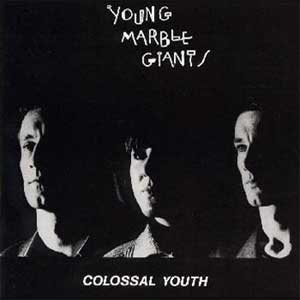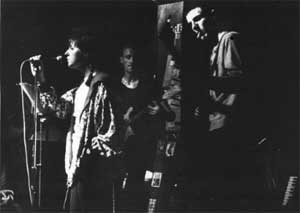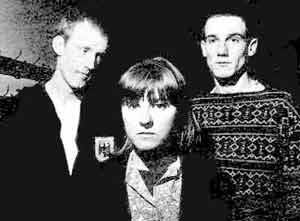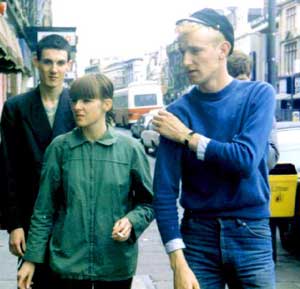
No.4 Colossal Youth
Young Marble Giants (1980)
Named after a phrase about Kouros, a famous statue (a colossal statue of a youth) from a book on Greek architecture, the Young Marble Giants were a three-piece from Cardiff, consisting of Stuart Moxham (guitars, keyboards), his brother Phil (bass), and Alison Statton (vocals). They were fans of Devo, Kraftwerk, and early Ultravox. Stuart, the main songwriter and creative force, admired early Roxy Music, Neil Young, James Taylor, Joni Mitchell, the Beatles and Steve Miller. It would be a short but eventful band experience, between 1979 and 1981.
Stuart Moxham learned guitar at a young age and convinced his younger brother Phil to do the same, eventually ending up in a band called True Wheel, where Alison was a backing vocalist; she and Phil were dating at the time. Whilst working at a Virgin records shop in Cardiff, Stuart decided to form a band, enlisting Phil and Alison.
Young Marble Giants contributed two tracks: Ode To Booker T and an early version of Searching For Mr. Right to a Cardiff compilation album, Is The War Over? The material featured no loud guitars or even a drum kit, percussion coming from cheap beatboxes and keyboards.
Rough Trade records in London heard these songs and offered YMG a deal. Despite the band’s trepidation, they agreed to record a 15-song album, Colossal Youth, recorded for just £1,000. Two singles, Final Day (four songs) and the Testcard EP (six brief instrumentals) followed. When John Peel played some tracks from the album the word went out. ‘Did you hear that band on Peel last night? Wow!’
Comments such as this were being uttered all over the UK in the days following the broadcast. And the reasons for such interest were outstanding songs, unique, minimalist arrangements and Alison Statton’s crystal clear voice. The sound was unlike anything anyone had ever heard and it resulted in a truly beguiling album.
Searching For Mr Right fades in with the soon-to-be distinctive staccato guitar and what sounds like bopping coconut shells before Alison’s understated vocal enters, outlining her frustrations and cynicism: Searching for Mr Righ t/ waiting up half the night
feeling like I'll be dead before I'm old /teaching myself to be the young untold. This dry fatalism unfolds over a lovely tune highlighted by marvellous bass patterns, dancing amongst the verses like a playful sprite.
A moody slide guitar phrase heralds Include Me Out, with its bobbing melody and nostalgic reminiscences:
Re-arranging the atoms in my hairdo
gets me thinking 'bout good times I had with you
back in the Sixties when love was free
never need to worry bout my G.C.E.
The track has a rare guitar solo, suitably restrained, played in the high register and treated with reverb.
The Taxi is a splendid instrumental, riveted to a military rhythm from a cheap Woolworths-type Bontempi organ which also supplies the melody. A distorted CB radio conversation is flown into the track a la I Am The Walrus, adding to the atmospherics delightfully.
Have you ever heard of noddemix? No? Noddemix is a Swiss cereal bar, but is more accurately a generic term for mixed nuts! Such was the source of inspiration for Alison Statton and Phil Moxham, who wrote Eating Noddemix. Lonely bass notes plonk slowly and these extraordinary words unravel a dual circumstance:
Staring at the mirror on the steamy bathroom wall
eating a Noddemix
as the people are running the high-rise starts to fall
while she neatly wipes her lips
the reporters pick up their pads and pens
as they rush to the scene
and the cameras wink on the gory views
how the editors agree
So here we have a lyrical structure worthy of a David Lynch screenplay: simultaneous plotlines, the banal alongside the catastrophic.
Putting on her makeup she glances at the clock
next she'll paint her nails
the train has collided - the driver didn't stop
as she slips onto the scales.
And all of it sung in a becalmed schoolgirl delivery, innocently emphasising unnerving contradictions.
Constantly Changing is a short poem set to another memorable melody. An intelligent, versatile bass arrangement plays over shuddering, damped guitar as Alison chants the few simple lines:
And when I see you
constantly changing
never the same as, never remaining
I cannot fix you in a position
where I would lose you out of my vision
for you are movement
and that is nothing
Amongst an album stuffed to overflowing with fantastic songs, N.I.T.A. (‘Nature Intended The Abstract’) is one of the finest. With childlike simplicity, two organs introduce the piece, one supplying a music bed, the other playing the lead tune, a beautiful, hymnal air that calms and soothes yet avoids blandness. This is underpinned by more jagged rhythm guitar. In a voice full of regret, Alison conveys her dejection:
It's nice to hear you're having a good time
but it still hurts 'cos you used to be mine
this doesn't mean that I possessed you
you're haunting me because I let you
shape up your body "Let's be a tree"
visual dynamics for you to see
nature intended the abstract for you and me
Colossal Youth is a poppy thing, playful and silly, perhaps included in this sequence (following NITA’s sadness) in order to offset the pensive ambience. Against a crudely cheap and distorted drum machine, hamstrung vox-continental keyboards (performed purposefully badly) career and jostle for position as if toddlers have been allowed to play with electronic gear. It contains a really brilliant lyric:
If you think the world lies at the top of your legs
And you only live when you are in bed
Then you are not in this world
The world is your head
Music For Evening comes in with snakelike bass, in what sounds like two overdubbed bass parts. A guitar, played with enigmatic guile, shimmies to the front of the mix, the higher bass carries the tune and the cool, gentle voice of Alison Statton hovers in the space above:
Keep your music for evenings
and your coffee for callers
say goodbye to your freedom
don't come here with your wallet
One after another, the gorgeous melodies keep coming. This remarkable work rate continues with The Man Amplifier, a sprightly number possibly influenced by folk music. Organs harmonise, a fairground ambience is created in which Phil Moxham’s audacious bass outlines a sexy tarantella. The titular android needs care, attention and er, grooming:
Take a towel to his brow
soothe the features of the proud
lubricate the inner man
exercise him when you can
and be singing
Choci Loni is bizarre, a one-riff jingle with one verse repeated.
A twangy, spaghetti western guitar appears playing an attractive, economic pattern and Miss Statton simply follows the tune, intoning frankly surreal lines:
Eaten out of house and home,
Choci Loni starts a roam
putting on a bandolier,
hearing through a nudie ear
Choci Loni roams
A palpitating beatbox introduces the sensational Wurlitzer Jukebox.
Creative, despondent guitar follows, aided by a restless bass which weaves back and forth like a rodent hunting for scraps. The guitar on the choruses, where Alison sings the title, are divine, an impressive example of technical prowess and a delicate touch, elegantly executed.
Just four lines long, the lyric of Salad Days is again really just a bit of poetry set to music. After a few pleasant instrumental bars, the wistful voice imparts its nostalgic thoughts and quietly departs, without a fuss.
Credit In The Straight World was covered by Hole, in 1994, giving the gifted but broke Stuart Moxham a much needed – and deserved! – injection of cash. The original version here starts off with more of those exemplary spiky guitars and some neat bass harmonics. Taken at a jolly pace and maintaining an optimism scarcely touched on elsewhere on the album, it could be called groovy.
This upbeat stance carries into the next track, the magisterial Brand New Life. Infectiously melodic without being related to anything as derivative as rock n’ roll, Stuart Moxham’s paean to rebuilding one’s pride in the aftermath of a ruined relationship is one of the star turns on an already stunning collection. Real anguish and yearning is here:
I've been hurt before,
sorrow knocking on my door
pain...
and so I make a brand new life
fashioned out of brand new strife
and when I hear the doorbell ring
I can never let them in to me
The album ends with a cute instrumental, Wind In The Rigging, a foretaste of the superb Testcard EP that would follow. Crestfallen, it imparts a wistful impression with its cascading, reverberated organs.
Young Marble Giants played gigs in the UK and went to America for a tour in late 1980, but creative differences and intergroup tension set in and conflicts came to a head during that tour and the trio split up on their return to Britain. The reasons are still murky. Here’s Stuart Moxham in a recent interview:
“I was cheesed off. I thought, well, I'm doing sort of 80% of the work here anyway, writing the songs and the melodies and everything, the lyrics, half the drum machine stuff, even some of the bass lines. I don't want to diminish the input that Phil made musically and of course the impact of Alison's singing, but in terms of the actual amount of creative work... And also I was managing the band as well, which I never thought about at the time, I just did it. I just thought, well, I can do this on my own.”
He can be proud of this awesome masterpiece though! Along with Unknown Pleasures by Joy Division, Colossal Youth is one of the most influential albums of the entire new wave period – indeed, in my opinion, of all time.
If you are young and haven’t heard it, go and get it! Now!
(I am grateful to Mike Appelstein, the creator of a wonderful YMG web site, for allowing me to use a little of his own text for the introduction to this piece. Thanks, Mike. (www.appelstein.com/ymg/)
Part 5 • The Only Ones • Baby's Got A Gun
|
|
|
|
|
|



